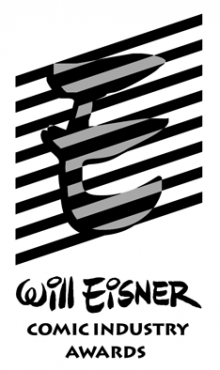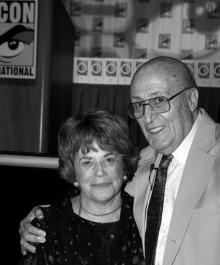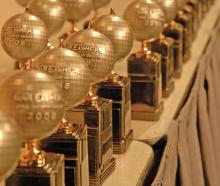Eisner Awards History
The Will Eisner Comic Industry Awards: A Brief History

The Will Eisner Comic Industry Awards, considered the “Oscars” of the comic book industry, are handed out each year in a gala ceremony at Comic-Con International: San Diego. Named for renowned cartoonist Will Eisner (creator of “The Spirit” and pioneer of the graphic novels), the Awards are given out in more than two-dozen categories covering the best publications and creators of the previous year.
The Eisner Awards were not always the Eisner Awards. At one point they were the Kirby Awards—sort of.
Back in 1984, Fantagraphics Books instituted the Jack Kirby Awards to honor the best works and creators in comics. The administrator of the awards was Dave Olbrich, a Fantagraphics employee. The awards were given out beginning in 1985 in programs at Comic-Con, with Jack Kirby himself on hand to congratulate the winners.
When Olbrich left Fantagraphics for other pursuits in 1987, the Kirby Awards came to an end, and two new awards programs were born: Fantagraphics started the Harvey Awards (named after Harvey Kurtzman), and Olbrich started the Will Eisner Comic Industry Awards. Set up as a nonprofit organization, the Eisners were given out at Comic-Con like the Kirbys had been, only now with Will Eisner on stage to hand out the awards.

The first Eisners were conferred in 1988, for works published in 1987. Olbrich administered the awards for two years, but there were no awards in 1990. At that time it was proposed that Comic-Con take over the awards, as the responsibilities involved had grown and Olbrich had other commitments. Thus, the first Will Eisner Awards given out under Comic-Con auspices occurred at the 1991 show, with Jackie Estrada as the new administrator. Jackie has continued in that role ever since.
At first the Eisners were given out at a daytime programming event. Then they became Comic-Con’s Thursday night special event, with the Inkpot Awards banquet being held on Friday night and the Masquerade on Saturday. In 1995 the Eisners and Inkpots combined into one ceremony, with no banquet. The Eisners have remained Comic-Con’s big Friday night event, at first being held at the Hyatt, then in Ballroom 20 at the Convention Center, and finally in the Indigo Ballroom at the Hilton San Diego Bayfront.
The program for the awards ceremony has evolved along with the setting. For several years cartoonist Scott Shaw! MC’d the Inkpot Awards portion of the evening, and Jackie Estrada MC’d the Eisners. Comic-Con’s other awards—the Manning and the Clampett—were also presented as part of the festivities. As the number of award categories grew, the ceremony became increasingly longer, and eventually the Inkpots came to be given out to recipients at programs during the day and not at the Friday night event. The Will Eisner Spirit of Comics Retailier Award is also a part of the program.

The Eisners had its first keynote speaker in 1995, when Neil Gaiman set the tone for the evening by addressing the nature and meaning of awards. In subsequent years, memorable keynote speakers have included Dave Gibbons, Frank Miller, and novelist Michael Chabon, who made an eloquent plea for better comics for kids.
For many years the Eisner ceremony was MC’d by Bill Morrison (creative director, Bongo Comics). Beginning in 2011, the format changed to one without an overall MC. Those who attend the ceremony today can expect big screen graphics representing the nominees and presenters ranging from comics’ biggest names to such celebrities as George R. R. Martin (Game of Thrones), Trisha Helfer (Battlestar Galactica), Tom Lennon and Ben Garant (Reno 911), Brandon Routh (Superman Returns), Thomas Jane (The Punisher), Jane Wiedlin (the Go-Gos), Samuel L. Jackson (The Avengers), Joss Whedon (Buffy, The Avengers), comedian Patton Oswalt, and the always popular British talk-show host Jonathan Ross.
But the main focus of the ceremony is on the works and creators being honored by the event. The list of nominees is treated as a shopping list by fans of comics and graphic novels who are looking for the best material being published. In addition, publishers proudly display the Eisner Award logo on their nominated and winning books.